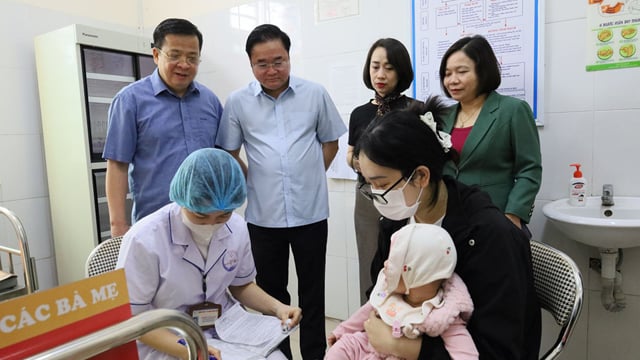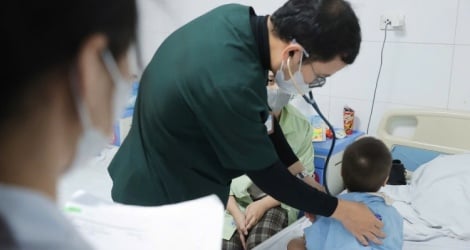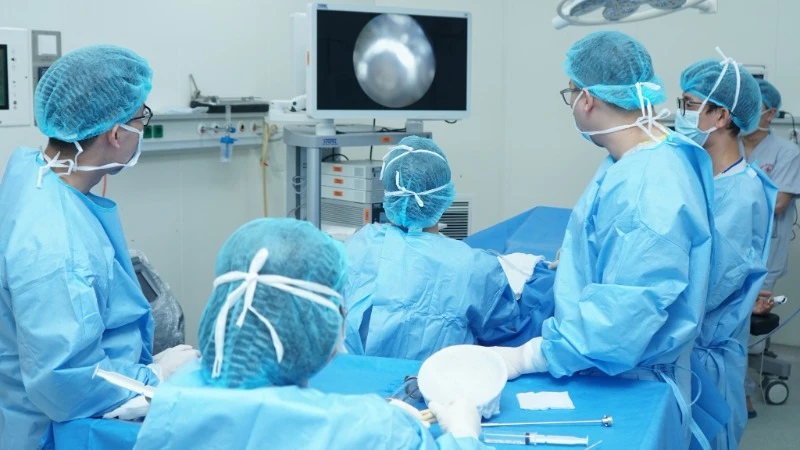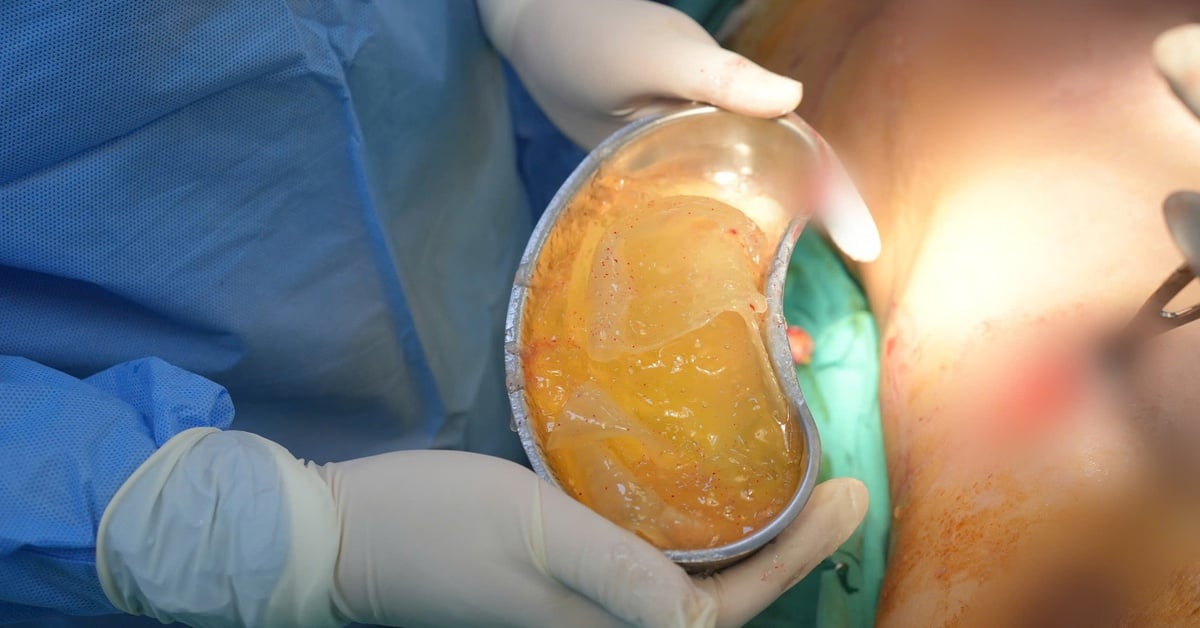Medical news August 28: Vaccination campaign launched with over 1 million doses of measles vaccine
The Ministry of Health has just sent a document to the People's Committees of provinces and cities regarding the implementation of measles vaccination.
Accelerating measles vaccination campaign
The Ministry of Health has just issued Decision No. 2495/QD-BYT on the Plan to implement the measles vaccination campaign in 2024.
 |
| The Ministry of Health requires provinces to speed up measles vaccination. |
To proactively implement measures to prevent and control measles in a timely and effective manner and minimize the risk of spreading and outbreaks, the Ministry of Health requests the People's Committees of provinces and centrally-run cities to pay attention and direct relevant units to organize and implement the contents.
Specifically, for provinces and cities within the scope of implementation according to the Plan of the Ministry of Health in Decision No. 2495/QD-BYT dated August 22, 2024, it is necessary to urgently prepare and organize a measles vaccination campaign in 2024 in the area according to the Plan.
Based on the local measles epidemic situation, vaccination rate, testing and treatment capacity, available resources for epidemic prevention and control, etc., provinces and cities continue to coordinate with the Institutes of Hygiene and Epidemiology, Pasteur Institute to conduct risk assessments, identify risk areas at the district/commune/ward level, review subjects, propose additional areas and subjects to implement the measles vaccination campaign if necessary and report to the Ministry of Health (Department of Preventive Medicine).
At the same time, regularly and closely monitor the development of the measles epidemic, proactively strengthen surveillance, early detection and thorough handling of outbreaks, and prevent outbreaks in the community.
According to the leader of the Department of Preventive Medicine, the measles vaccination campaign is different from the catch-up and catch-up vaccination plans that have been implemented and the vaccination target has been expanded.
Specifically, previously, the vaccine was only given to children aged 9 months and 18 months. However, in this additional campaign, the vaccination target is children aged 1 to 10 years, except for those who have received 2 doses of the vaccine.
The Ministry of Health has assessed the risk of the epidemic according to the toolkit provided by WHO and identified 18 provinces and cities with about 100 districts in the risk area. The Ministry of Health will conduct free measles-rubella vaccination for these subjects. It is expected to start vaccination from September 2024.
Ho Chi Minh City declares measles epidemic
According to Decision No. 3547 signed and issued on the afternoon of August 27, Ho Chi Minh City has announced that the infectious disease in the city is measles. The outbreak will occur in August 2024. The location and scale of the outbreak are throughout the city.
Measles is caused by the measles virus (Polynosa morbillorum). The disease is spread through the respiratory tract from person to person.
Measures to prevent and control epidemics must be implemented according to the Law on Prevention and Control of Infectious Diseases, including: Strengthening the Steering Committee for Disease Prevention and Control of the City, District, Thu Duc City; Wards, Communes, and Towns.
Cases of illness or suspected illness must make full and accurate declarations to health authorities within 24 hours of diagnosis to be managed and tested according to regulations.
Implement a campaign to supplement measles-rubella vaccination, regardless of previous measles-rubella vaccination history, for all children aged 1-5 years old living in the city; the age range can be expanded according to the epidemic situation in accordance with regulations.
The decision to declare a measles epidemic also assigned the Director of the Department of Health to preside over and coordinate with the Steering Committee for epidemic prevention and control of districts, towns, and Thu Duc City to deploy epidemic prevention and control measures in the management area; the decision to declare a measles epidemic took effect from August 27.
Rehabilitation reduces the risk of death by 30%
ICU patients (critically ill, life-threatening) receive early and effective rehabilitation, reducing the risk of death, complications and hospital stay by 30%.
MSc. Tran Van Dan, President of the Vietnam Physiotherapy Association, Head Technician of the Rehabilitation Department, Tam Anh General Hospital, Hanoi, said that patients assigned to the ICU (Intensive Care Unit - Anti-Poisoning) are often in critical condition or have a risk of worsening such as multiple organ failure, stroke, myocardial infarction, cardiogenic shock, severe pneumonia, collapsed lung, severe gastrointestinal bleeding, hepatic coma, acute pancreatitis, acute renal failure, and diabetic coma.
Cases of trauma, drowning, electric shock, septic shock, poisoning, etc. also fall into this category. Early rehabilitation exercises in the ICU should be considered when the patient regains consciousness, overcomes the critical stage and can still be in bed. This helps the patient reduce pain, recover faster, reduce treatment time and have longer lasting treatment effects, reducing the risk of re-treatment.
At the same time, it reduces complications such as collapsed lungs, muscle atrophy, pressure ulcers, serious respiratory and cardiovascular complications... Professor Dale Needham, Director of the intensive care and rehabilitation program, John Hopkins University Hospital, USA, said that patients in the ICU often need the support of a ventilator, which affects respiratory function and limits mobility.
Long-term stay in the ICU will affect many functions in the body. On average, each week in the ICU, patients lose 4-5% of muscle mass, have muscle weakness, 13-16% reduction in organ function, and multiple organ failure. About 50% of patients in the ICU for 12 months have difficulty returning to work as usual.
Rehabilitation in the ICU requires a combination of respiratory, motor and other functional training, including the following areas: Physical therapy, occupational therapy, speech therapy, and assistive technology.
For example, with communication and swallowing rehabilitation in tracheostomy ICU patients, Dr. Charissa, University of Melbourne (Australia) said that speech therapy in the ICU helps re-direct the patient's airflow through the upper airway.
This promotes resensitization of the patient's larynx; improves vocal cord function and the ability to protect the airway and swallow; improves the patient's ability to manage secretions, such as speaking and coughing; and aids in weaning off tubes and oral feedings.
In addition, rehabilitation language therapy in the ICU also addresses communication issues. It helps patients express their identity, express their needs, and participate with medical staff in the treatment decision-making process.
Doctors have also pointed out the benefits of using high-flow oxygen machines (HFNC) in the treatment of ICU patients. In the ICU, the longer a patient is on a ventilator, the higher the risk of death.
Using HFNC machine helps improve respiratory failure in patients, improves blood oxygen, inhaled oxygen concentration improves by 100%; inhaled humidity by 100%, improves cilia activity, airway epithelium, increases mucus discharge... Thereby, reducing many risks.
Experts affirm that early rehabilitation in the ICU is very important, however, patient safety is always the top priority.
Patients need to be assessed for their ability to respond to exercise with consultation from multiple relevant specialists. If they respond to exercise and throughout the exercise process, patients need to be checked and adjusted to the appropriate level of exercise daily.
Patients can practice from simple to advanced. Depending on the level, they can practice in bed with basic movements, hand exercises, cane exercises, resistance leg movements, and even play games to improve coordination. Exercise programs with specialized equipment and machines will be implemented in coordination between ICU specialists and rehabilitation and physical therapy.
Source: https://baodautu.vn/tin-moi-y-te-ngay-288-trien-khai-chien-dich-tiem-chung-hon-1-trieu-lieu-vac-xin-soi-d223494.html


![[Photo] Moment of love: Myanmar people are moved to thank Vietnamese soldiers](https://vstatic.vietnam.vn/vietnam/resource/IMAGE/2025/4/3/9b2e07196eb14aa5aacb1bc9e067ae6f)

![[Photo] General Secretary To Lam receives Japanese Ambassador to Vietnam Ito Naoki](https://vstatic.vietnam.vn/vietnam/resource/IMAGE/2025/4/3/3a5d233bc09d4928ac9bfed97674be98)
![[Photo] Special relics at the Vietnam Military History Museum associated with the heroic April 30th](https://vstatic.vietnam.vn/vietnam/resource/IMAGE/2025/4/3/a49d65b17b804e398de42bc2caba8368)














![[Video] Hanoi strengthens food safety control at schools, tightens handling of violations](https://vstatic.vietnam.vn/vietnam/resource/IMAGE/2025/4/3/c9a2202768fb4d6dbd70deaf3f28979f)













































































Comment (0)